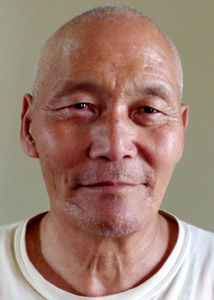Name: Drukdak
(Alias: No)
Gender: Male
Interview Age: 67
Date of Birth: 1948
Birthplace: Sok Tsendhen Gang, Kham, Tibet
Year Left Tibet: 1983
Profession: Farming, Herding
Monk/Nun: No
Political Prisoner: No

Interview No.: 2N
Date: 2015-04-07
Language: Tibetan
Location: Kathmandu, Bagmati, Nepal
Categories: Culture and History
Keywords: childhood memories, Chinese rule -- life under, farm life, herding, Kham, medical treatment, monasteries -- destruction of , salt trade, thamzing/struggle sessions
Summary:
Drukdak was born in a small village called Sok Tsendhen Gang in Kham Province. He describes their livelihood as samadok 'farmers and herders.' They reared yaks, sheep, goats and horses in summer and grew crops like barley, turnips, wheat and radish in springtime. He recounts life as a young boy herding the animals and describes the dangers from wild animals in the mountains. He also had to protect the crops in the village from the livestock.
Drukdak describes the salt gathering expeditions to the north of his village. It took them around three months to travel and harvest the salt. He explains the two kinds of salt they collected and how the young men on horseback transported the salt on yaks to the village. He also gives some insight into village doctors and how ailments and injuries were treated.
Under Chinese occupation Drukdak witnessed the destruction of monasteries and holy images, and of lamas and monks being subjected to thamzing 'struggle sessions' and imprisonment. The Chinese barred Tibetans from chanting prayers and seeking an audience with His Holiness the Dalai Lama. Drukdak felt that he could not live without access to the Dalai Lama and religious freedom. For that reason he fled from Tibet.
Interview Team:
- Tenzin Yangchen (Interpreter)
- Katharine Davies Samway (Interviewer)
- Henry Tenenbaum (Videographer)

